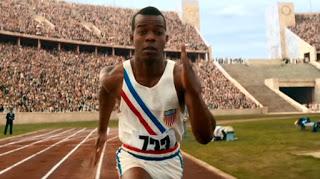 Stephen Hopkins' Race (2016) is slightly better than you'd expect it to be. An inspirational sports drama focusing on Jesse Owens, the American track star who defied Nazi Germany in the Berlin Olympics, it hits all the usual notes, but with a skill and texture that makes it worthwhile.
Stephen Hopkins' Race (2016) is slightly better than you'd expect it to be. An inspirational sports drama focusing on Jesse Owens, the American track star who defied Nazi Germany in the Berlin Olympics, it hits all the usual notes, but with a skill and texture that makes it worthwhile.Jesse Owens (Stephan James) attends Ohio State University in the mid-30s. Ignoring the prejudice of teammates and audiences alike, his amazing skill catches the eye of coach Larry Snyder (Jason Sudeikis) who spots him as a comer. Owens competes in intercollegiate championships, breaking numerous records and qualifying for the Olympic Games in 1936. Unfortunately, the US threatens to boycott the Olympics taking place in Nazi Germany, while Owens himself receives pressure to drop out. Urged on by Snyder, he decides to disprove the myth of Aryan superiority through competition.
Race's central story is familiar enough: the black athlete navigating prejudice, the tough-but-fair coach showing him the way, his proving himself in the big game despite doubts. But Hopkins and writers Anna Waterhouse and Joe Shrapnel tease out enough texture to intrigue even cynics. Owens has wrinkles missing from, say, 42's portrayal of Jackie Robinson: he has an affair that alienates his fiancee (Shanice Banton), and meets his match in Eulace Peacock (Shamier Anderson), who bests Owens in several head-to-head contests and only misses out on Berlin due to a freak injury. Thus Owens seems not only compelling but human, with his flaws making him more interesting.
Owens' story dovetails with the controversy surrounding the Berlin Olympics, treated by Hitler and friends as an opportunity to showcase the New Germany and highlight Aryan athleticism. Here Race doesn't shy away from moral complexity, showing Avery Brundage's (Jeremy Irons) efforts to negotiate an acceptable tamping down of prejudice while persuading American Jews to support it. Similarly, the movie contrasts Joseph Goebbels' (Barnarby Metschurat) nationalism with filmmaker Leni Riefenstahl (Carice Van Houten) shooting Olympia, deeming art and athletics more important than chauvinism.
Ultimately, Race comes down to Owens' incredible athletic feats, which are rendered in thrillingly shot, explosively edited and compelling. While Hopkins does resort to CGI tricks (especially a panning shot around the stadium to Owens' face) it's mostly classic, unadorned filmmaking. Another interesting subplot involves Owens befriending Luz Long (David Kross), a German long jumper who helps the American ace an early trial and bemoans the Nazis. Owens becomes a symbol of peerless sportsmanship, determination and resistance to prejudice.
Stephan James gives a winning turn that captures our affection, attention and respect. His Owens is supremely confident, hardworking yet headstrong, doing his best not to let the character's historical burden weigh him down. Jason Sudeikis provides the requisite coarse affection and goading humor to his stock role, while Jeremy Irons makes his character both devious and quietly principled. Carice Van Houten makes a striking Riefenstahl; one almost wishes she'd play Leni in a full biopic. David Kross is equally effective as an athlete with a heart.
While Race doesn't break any molds in biopic storytelling, it does grant a familiar story more depth and detail than a viewer might expect. We come out thinking Jesse Owens a flawed but heroic figure, allowing us to appreciate his achievements without wallowing in pathos. And who, except perhaps our president, doesn't enjoy watching fascists be humiliated?

